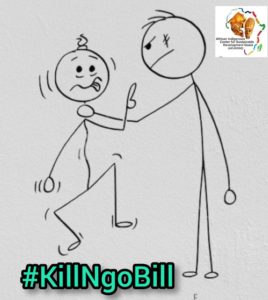No to NGO Bill – AIC4SDG
Written by Admin on August 6, 2022

It’s Stifling, Suffocating & Strangulating
The controversial NGO regulation bill is back in the house again, let’s rise against this draconian attempt.
Nigeria: ‘If passed, the NGO Bill will reduce the ability of CSOs to hold the government accountable and ensure that human rights are respected’
Interviews
CIVICUS speaks to Oluseyi Babatunde Oyebisi, Director of the Nigeria Network of NGOs (NNNGO) about the draconian NGO bill under consideration by Nigerian lawmakers and the implications that it would have for civil society. Based in Lagos, NNNGO supports Nigerian NGOs in their commitment to reduce poverty, promote human rights and spread the benefits of development among all people. NNNGO provides a range of services and opportunities to help its members achieve their organisational aims and exert influence on issues relevant to the national agenda.
1. Why is Nigerian civil society so concerned about the NGO bill under discussion?
Civil society in Nigeria is extremely concerned about the proposed NGO Bill (officially entitled ‘Bill for an Act To Provide For The Establishment Of The Non-Governmental Organizations Regulatory Commission For The Supervision, Co-ordination And Monitoring Of Non Governmental Organizations’). The bill was introduced in the House of Representatives in June 2016, and after two readings it was referred to the House Committee on Civil Society Organisations (CSOs) and Development Partners in July. Its approval it is still pending in the current eighth National Assembly.
As its name implies, the main objective of the bill is to establish a federal agency in charge of supervising, coordinating and monitoring CSOs in Nigeria. If passed, it will give the government sweeping powers over civil society, to the point of threatening its very existence.
The bill would make it compulsory for all CSOs operating in Nigeria to register with the government every two years and would require them to include details such as the location and duration of proposed activities as well as information on all sources of funding. The requirement of frequent re-registration would increase the administrative burden on CSOs; it will also be possible for the registration of CSOs that are critical of the government to be be denied or delayed if the government wants to restrict their activities in reprisal.
According to the proposed law, projects identified by CSOs for implementation will require prior government approval. The implication here is that the government will be able to decide arbitrarily whether to approve or reject projects depending on whether they focus on issues that they consider harmless or sensitive. In addition, the text of the proposed legislation states that CSOs will be required to provide “additional information” as requested by the Board during registration, but does not clarify what this “additional information” would be. Such “additional information” could potentially be any kind of documentation, including some that CSOs may not possess at the time of registration.
Finally, the bill does not place a ceiling on registration fees for CSOs but leaves its determination to the Commission’s discretion. Individuals who violate the provisions of the law will face up to 18 months in prison or a huge fine, and those convicted of such violations will be prohibited from holding office in an CSO for a period of 10 years.
In sum, if passed into law, this bill will be a democratic regression. Despite the significant progress made in the advancement of democracy and the development of civil society, the freedoms of association, assembly and expression are still restricted regularly in Nigeria, and this bill will greatly add to the ongoing restrictions.
2. How does civil society contribute to socio-economic development and democracy in Nigeria, and how will it be affected if the NGO Bill is passed?
Nigeria is home to many CSOs working in different sectors, including human rights, democracy, good governance, corruption, peace and security, health, women’s rights, children’s rights, the environment and development, to mention just a few. Civil society played an instrumental role during Nigeria’s transition from a military dictatorship to a democracy. Civil society continues to support the process of consolidating democracy by ensuring that elections are free and fair. CSOs continue to promote, protect and defend the rights of citizens and to hold the government accountable for its human rights commitments. In addition, several civil society groups campaigned for the Millennium Development Goals to be met and many more are now working on commitments towards the fulfilment of the Sustainable Development Goals (SDGs). Still many others work to protect media rights, the freedom of expression and online rights.
If the NGO Bill is passed into law, the contributions of civil society risk diminishing drastically. The restrictive provisions of the bill give the authorities powers to decide which organisations can register and what kinds of activities civil society is allowed to carry out. This means human rights groups and CSOs critical of the government will easily be targeted every time they need to register or re-register. This will no doubt reduce the ability of CSOs to serve as watchdogs, hold the government accountable and ensure that human rights are respected. The bill will likely reduce the participation of citizens in the democratic process. It will reduce the contributions from civil society to the SDGs and silence those that speak out against corruption.
3. What are NNNGO and other civil society groups doing to push back on this bill?
NNNGO and other CSOs have advocated for the bill to be withdrawn and we have organised and participated in meetings with various actors to produce a common perspective on the bill and decide on collective actions to take. We have carried out advocacy work with the leadership of the National Assembly and the House Committee. We did an in-depth analysis of the bill and its implications for civil society and shared briefs with the sponsor of the bill and the House Committee on CSOs. We jointly organised a peaceful march in Abuja and Lagos, and we asked the Lagos state government to make a request to the National Assembly not to consider the bill.
In addition, NNNGO created a platform through its annual conference for engaging with regulators in Nigeria to strengthen existing laws. We did a review of the Companies and Allied Matters Act (CAMA) – the law guiding civil society registration in Nigeria – and made recommendations to the Corporate Affairs Commission and Senate Technical Committee on the Review of CAMA. We continue to mobilise civil society against the bill through both the mainstream media and social media.
4. Why were public hearings on the bill scheduled, and what was their outcome?
A public hearing was hastily scheduled by the Nigerian authorities for 14 and 15 December to seek feedback from CSOs on the bill. Despite the short notice, over 180 CSOs were in attendance with around 30 memoranda submitted and adopted. While the hearings were taking place in the National Assembly, hundreds of people demonstrated outside, wearing t-shirts and bearing banners with the slogan #NoToNGOBill.
None of the attendees supported the bill, and all the organisations that made presentations explicitly rejected it. A report of the public hearing is expected to be presented by the House Committee to the House Plenary sometime soon, and we hope it will have some influence in stopping the passage of the law.





 Inform Me Radio
Inform Me Radio